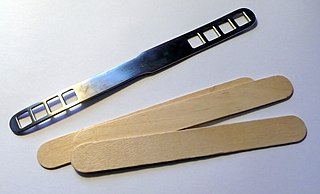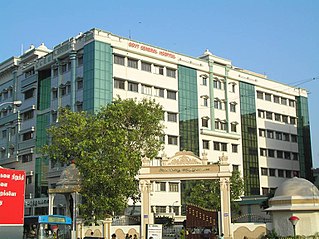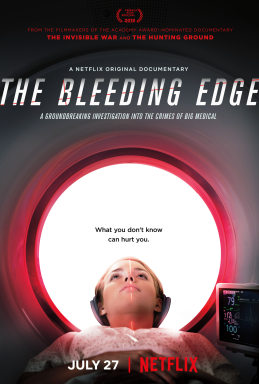Related Research Articles
Medical physics deals with the application of the concepts and methods of physics to the prevention, diagnosis and treatment of human diseases with a specific goal of improving human health and well-being. Since 2008, medical physics has been included as a health profession according to International Standard Classification of Occupation of the International Labour Organization.
Medical software is any software item or system used within a medical context, such as:reducing the paperwork, tracking patient activity

GE HealthCare Technologies, Inc., doing business as GE HealthCare, is an American multinational medical technology company headquartered in Chicago, Illinois. It was spun-off from General Electric on January 4, 2023, with GE retaining 10.24%. As of 2017, it is a manufacturer and distributor of diagnostic imaging agents and radiopharmaceuticals for imaging modalities used in medical imaging procedures. It offers dyes used in magnetic-resonance-imaging procedures; manufactures medical diagnostic equipment, including CT image machines; MRI, XRAY; Ultrasound; Cath Labs; Mammogram; Nuclear Medicine Cameras; and develops Health technology for medical imaging and information technologies, medical diagnostics, patient monitoring systems, disease research, drug discovery, and biopharmaceutical manufacturing. It was incorporated in 1994 and operates in more than 100 countries.
Biomedicine is a branch of medical science that applies biological and physiological principles to clinical practice. Biomedicine stresses standardized, evidence-based treatment validated through biological research, with treatment administered via formally trained doctors, nurses, and other such licensed practitioners.

A medical device is any device intended to be used for medical purposes. Significant potential for hazards are inherent when using a device for medical purposes and thus medical devices must be proved safe and effective with reasonable assurance before regulating governments allow marketing of the device in their country. As a general rule, as the associated risk of the device increases the amount of testing required to establish safety and efficacy also increases. Further, as associated risk increases the potential benefit to the patient must also increase.
Health technology is defined by the World Health Organization as the "application of organized knowledge and skills in the form of devices, medicines, vaccines, procedures, and systems developed to solve a health problem and improve quality of lives". This includes pharmaceuticals, devices, procedures, and organizational systems used in the healthcare industry, as well as computer-supported information systems. In the United States, these technologies involve standardized physical objects, as well as traditional and designed social means and methods to treat or care for patients.
Siemens Healthineers is a German company which provides healthcare services. It was spun off from its parent company Siemens in 2017, which retains a 75% stake. Siemens Healthineers is the parent company for several medical technology companies and is headquartered in Erlangen, Germany.
Eucomed was the organisation that represented the interests of the medical device industry in Europe. It represents directly and indirectly 4,500 designers, manufacturers and suppliers of medical technology used in the diagnosis, prevention, treatment and management of disease and disability. Eucomed represents a total of 11,000 legal entities in Europe. It is now part of MedTech Europe.
Medical biology is a field of biology that has practical applications in medicine, health care and laboratory diagnostics. It includes many biomedical disciplines and areas of specialty that typically contains the "bio-" prefix such as:
AdvaMed, or the Advanced Medical Technology Association, is an American medical device trade association, based in Washington, D.C. It is the largest medical device association in the world with U.S. and international members who are medical technology companies that collectively represents 80% of U.S. medical technology firms in the United States, that produce close to 90% of annual health care technology purchases in the United States and more than 40% globally.

Healthcare in Chennai is provided by both government-run and private hospitals. Chennai attracts about 45 percent of health tourists from abroad arriving in the country and 30 to 40 percent of domestic health tourists. The city has been termed India's health capital. Multi- and super-specialty hospitals across the city bring in an estimated 150 international patients every day. Factors behind the tourists' inflow in the city include low costs, little to no waiting period, and facilities offered at the speciality hospitals in the city.
Medtech or MedTech may refer to:
ReliantHeart, Inc. is a privately held American company headquartered in Houston, Texas that designs, manufactures, and provides remote monitoring capabilities for its left ventricular assist devices which are used to assist circulation for failing hearts.
The Association of British HealthTech Industries, formerly the Association of British Healthcare Industries is a trade association for the medical technology sector in the UK. It has about 250 member companies which together provide 80% of the medical technology used in the NHS. It has offices in London. Members include the UK operations of multinational companies.

Andhra Pradesh MedTech Zone(AMTZ) is the medical technology park with Common Manufacturing Facilities & Common Scientific Facilities located in Nadupuru village area of Visakhapatnam, adjacent to the Visakhapatnam Steel Plant. The AMTZ is spread over an area of 270 acres and it has over 10 manufacturing units.

The Bleeding Edge is a 2018 Netflix original documentary film that investigates the $400 billion medical device industry.

Regulation (EU) 2017/746 (IVDR) is a regulation of the European Union on the placing on the market and putting into service of in vitro diagnostic medical devices (IVD), repealing Directive 98/79/EC (IVDD), which also concerned IVD. The regulation was published in April 2017 and is closely aligned to the EU regulation on medical devices. Changes compared to the IVDD include changes in device classification, stricter oversight of manufacturers by Notified Bodies, introduction of the "Person Responsible for Regulatory Compliance" (PRRC), the requirement of UDI marking for devices, common specifications, Eudamed registration, and increased post-market surveillance activities.
Brett Lyndall Singh is a South African medical doctor and healthcare entrepreneur. He is the Chairperson of the South African National Department of Trade, Industry and Competition’s national Healthcare Products Masterplan Global Value Chain Working Group. He is also CEO of Alpha and Omega MedTech and subsidiaries.
An orphan device is a product or an equipment intended for the prevention, prediction, diagnosis, support, treatment or management of a life-threatening or chronically debilitating disease with a low prevalence/incidence, most notably for rare diseases. Orphan medical technology is then considered as both the medical device and the connectivity of the device. Many orphan devices provide essential functions for patients with rare diseases, their carers, and the healthcare professionals using them. Nevertheless, there are very few medical devices that are specifically developed for rare diseases. At the same time, many patients and carers express a substantial unmet need for new medical devices for their conditions.

Meril Life Sciences is an Indian multinational medical device company, with headquarters in Vapi, Gujarat, India. It was founded in 2006 and is a part of the Bilakhia Group. The company is engaged in the manufacturing of vascular intervention devices, orthopedic implants, endosurgery, ENT products and in-vitro diagnostics. Meril Life Sciences operates in over 100 countries and has employed 4000 people, as of 2022.
References
- ↑ "About us - MedTech Europe, from diagnosis to cure". MedTech Europe. Retrieved 2019-03-01.
- ↑ "European diagnostics and medical technology organisations join forces". PMLiVE. 2012-01-18. Retrieved 2013-11-25.
- ↑ "Scrip Regulatory Affairs - Serge Bernasconi named first head of Eucomed/EDMA alliance". Rajpharma.com. 2012-07-10. Retrieved 2013-11-25.
- ↑ "Qu'est-ce que la Medtech en France ?". Big Média Bpifrance.fr (in French). Retrieved 2023-06-05.
- ↑ "Medical technologies regroup at EU level into one single representation: MedTech Europe". MedTech Europe. 2016-11-29. Retrieved 2019-03-01.
- ↑ "European med-tech industry launches 5-year strategy". MassDevice. 2011-10-12. Retrieved 2013-11-25.
- ↑ "Going for the EU jackpot: Parliament wins fast-track outcome for EU medtech reg negotiations". Clinica. 2013-10-22. Retrieved 2013-11-25.
- ↑ "The European Medtech Forum 2013 - Swedish Medtech". Swedishmedtech.se. Retrieved 2013-11-25.